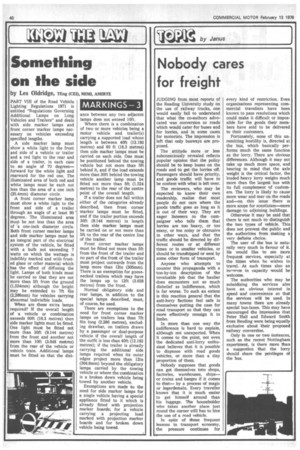Nobody cares for freight
Page 42

If you've noticed an error in this article please click here to report it so we can fix it.
by Janus
JUDGING from most reports of the Reading University study on the use of railway tracks, one would easily fail to understand that what the co-authors advocated was conversion to roads which would cater for buses and for lorries, and in some cases for motorists. The impression is left that only husways are proposed.
The attitude more or less subconsciously revealed reflects popular opinion that the policy should be to keep buses on the roads and to got the lorries off. Passengers should have priority, and goods traffic will have to be content with what is left over.
The reviewers, who may be expected to know their own readership, realise that most people do not care where the goods traffic goes as long as it is out of their way. They are eager listeners to the campaigner who tells them that lorries are too heavy, or too many, or too noisy or obtrusive in other ways, and that the traffic should be directed by different routes or at different times or in smaller vehicles, or should be transhipped or sent by some other form of transport.
Anyone who attempts to counter this propaganda with a ton-by-ton description of the invaluable job that the haulier does encounters not so much disbelief as indifference, which is far worse. To such an extent is this reaction general that the anti-lorry factions feel safe in themselves putting the case for road transport so that they can more effectively consign it to limbo.
In more than one way the indifference is hard to explain, although not unexpected. When it comes to the point, not even the dedicated anti-lorry enthusiast believes that it is possible to dispense with road goods vehicles, or more than a tiny proportion of them.
Nobody supposes that goods can get themselves into shops, factories, warehouses, ships— or trains and barges if it comes to that— by a process of magic or legerdemain. Every traveller knows that it is much easier to get himself around than his luggage. The householder who takes another place just round the corner still has to hire the use of a mad vehicle.
In spite of these frequent lessons in transport economy, the pressure continues for
every kind of restriction. Even orgartisations representing commercial travellers have been known to pass resolutions whith could make it difficult or impossible for the goods their members have sold to be delivered to their customers.
Fortunately, none of this unremitting hostility is, directed at the bus, which basically performs much the same function as the lorry. There are obvious differences. Although it may not take up much more space, and bearing in mind that the axle weight is the critical factor, the loaded heavy lorry weighs much more than the largest bus with its full complement of customers. The lorry is likely to cause more wear and tear on the roads and—on this issue there is more scope for scepticism—more damage to adjoining buildings.
Otherwise it may be said that there is not much to distinguish the two types of vehicle. This does not prevent the public and the authorities from making a very definite choice.
The user of the bus is naturally very much in favour of it. He would like tO see more frequent services, especially at the times when he wishes to travel. ,it such times also an ieceease in capacity would be welcome.
The authorities who may be subsidising the services also have an obvious interest in speed and convenience so that the services will be used. In many towns there are already special bus-lanes. This may have encouraged the impression that Peter Hall and Edward Smith from Reading were being equally exclusive about their proposed railway conversion.
Only in one or two instances, such as the recent Nottingham experiment, is there more than a suggestion that the lorry should share the privileges of the 'bus.




























































































